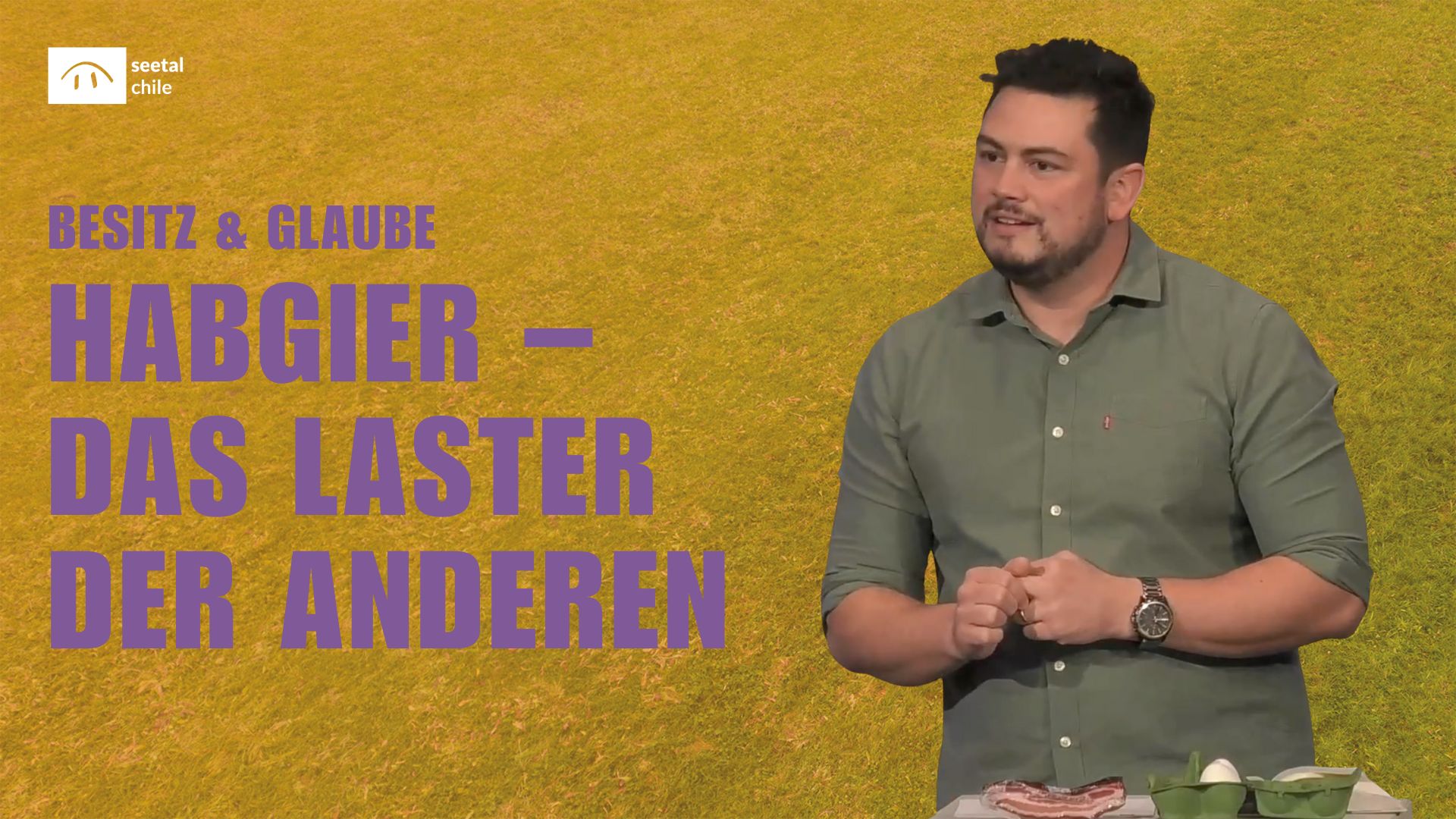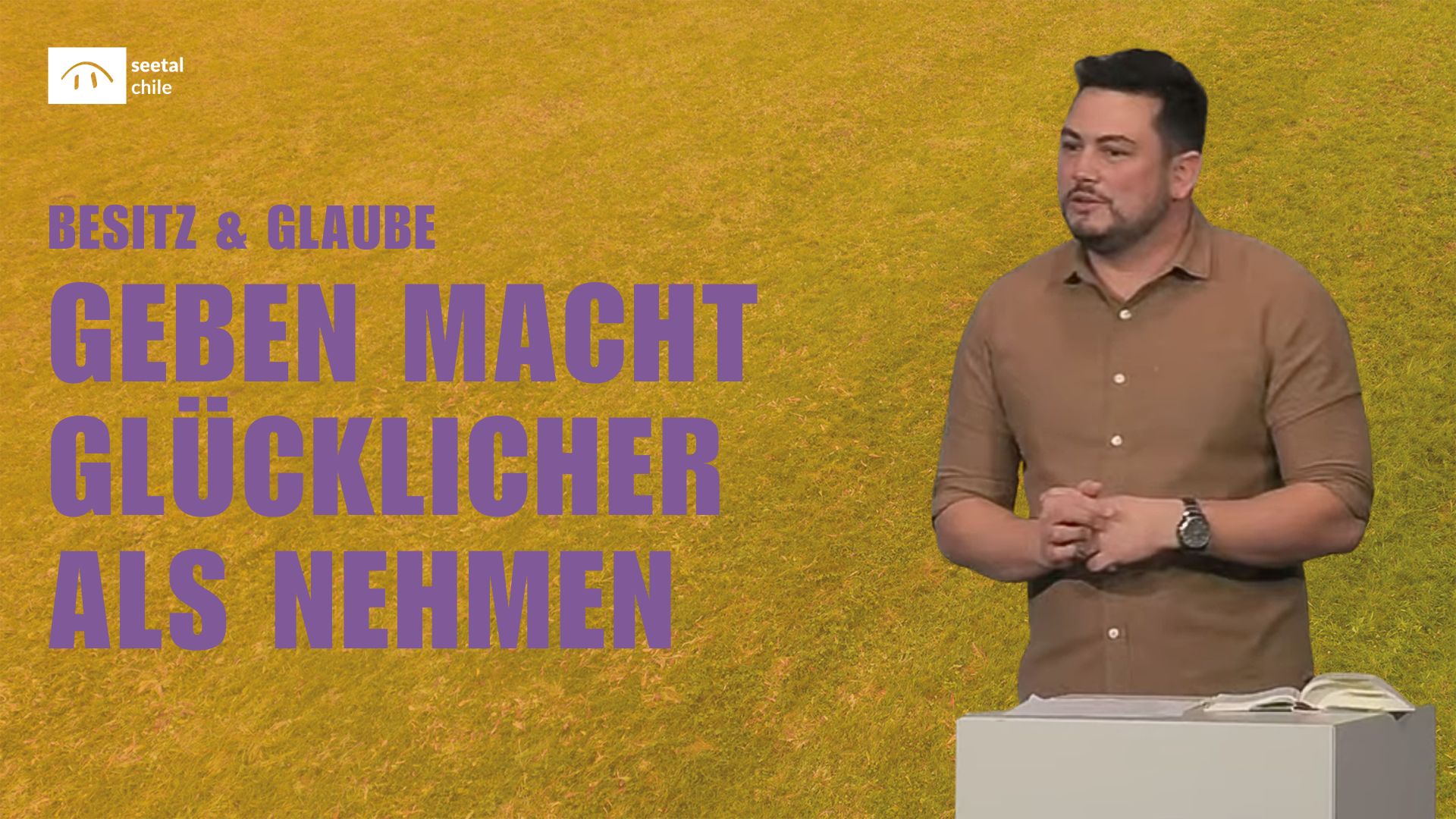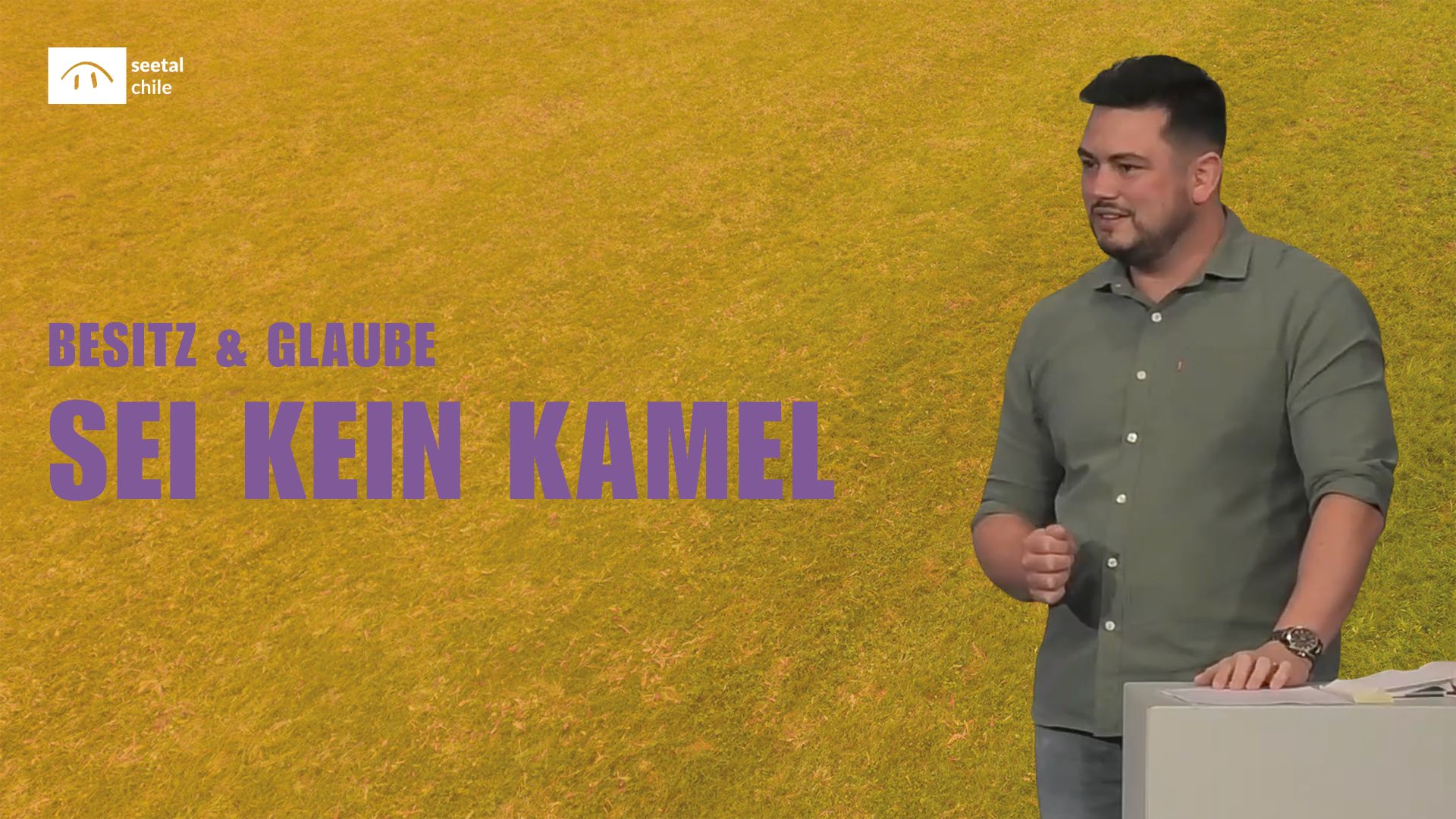Ownership & Faith | Don’t be a camel
Series: EIFACH muetig – with Jesus as a role model | Bible text: Mark 10:17–31
People with possessions are in particular danger of following them and not Jesus Christ. The incident of the young man with Jesus shows that Jesus, as the Son of God, wants him to come first. The kingdom of God has dawned with Jesus. We cannot earn it – it is pure grace. But in order for us to share in it, Jesus Christ should be our most important possession. This is why dealing with our possessions is an important part of following Jesus. It is not about falling into activism with our possessions, but about worshipping Jesus with our possessions – by caring about what is important to him.
Today we are starting the last sermon series on our annual theme «EIFACH muetig – mit Jesus als Vorbild». It is the start of the Possession & Faith sermon series. We are trying something new in this series: You have the opportunity to ask your questions. After the sermon series, we will film a Q&A and publish it on YouTube. You can submit your questions via the comments on YouTube.
Jesus Christ talks a lot about possessions and money. Of the almost 8000 verses in the New Testament, 2084 deal with finances and stewardship – almost a quarter! At least every third parable revolves around this topic. Jesus» statements about possessions are primarily statements about the reality of dealing with what we have – not prohibitions or commandments.
Would you relate the story of today’s text reading to you personally? Today’s sermon is intended to help you gain a perspective on what these biblical passages have to say about ownership and faith.
The rich man in me!
Jesus is about to set off when a young man comes to him with a question: «[…] Good teacher, what shall I do to obtain eternal life?» (Mark 10:17 NLB). Three things are very important in this short enquiry.
Firstly, he calls Jesus good. Jesus» answer is also based on this: « «Why do you call me good?» Jesus asked. «Only God alone is good» » (Mark 10:18 NLB). This man came to Jesus and asked him this question. But who did he think he was looking at? The Son of God? The king of Israel? An important teacher (rabbi)? Although he knelt before him, he «only» saw him as a teacher. Jesus» answer makes this clear: only God is good! But Jesus also claims this for himself. He doesn’t just want to be a teacher! Who is Jesus for you? Is he a good teacher? The King of Israel? God himself?
Secondly, the young man asks about eternal life. By this he means the kingdom of God. He wanted to know how he could participate in the kingdom of God. He longed for something greater than the here and now. With Jesus, the kingdom of God dawns on earth. He brings the kingdom of God near (Mark 1:15). What is the kingdom of God? It is the royal rule of God over his creation. The life of Jesus Christ makes this clear: the sick are healed, the blind can see, the dead are raised, sins are forgiven. But this is not an end in itself. In all of this, all honour is given to God.
Thirdly, the young man asks what he should do. He focusses on doing. Behind this lies the opinion that he can earn the kingdom of God. This is precisely where Jesus Christ comes in. He lists commandments five to nine and adds one more. But the man claims that he has done all this since he was a child. Instead of praising him for this, he now comes up with a serious retort: «Then Jesus looked at the man with love. «You still lack one thing,» he said to him. «Go and sell everything you have and give the money to the poor; then you will have treasure in heaven. Then come and follow me» » (Mark 10:21 NLB). One thing must not be overlooked in this powerful invitation: Jesus looked at the man with love! When Jesus asks us to do something difficult, it is out of love! Elsewhere, Jesus was once asked what the most important commandment was. His answer: Love God and your neighbour (Mark 12:29–31). The man was not prepared to share his possessions with others. This shows us that he did not love his neighbour as himself! It is interesting to note that five of the ten commandments were missing from Jesus» answer. But which ones? They are the ones concerning the relationship with God – and the tenth, which is about desire. The young man’s main problem was that he put his wealth first and trusted it more than God!
His successors were dismayed
What does the answer to this young man do to the followers of Jesus? It gets even worse: « «A camel goes through the eye of a needle rather than a rich man enters the kingdom of God! The disciples were dismayed. «Who then can be saved at all?» they asked» (Mark 10:25–26 NLB). This answer dismayed his followers. They did not assume that many possessions could save. But they saw possessions as a sign of divine favour.
From the very beginning, God had promised to bless his people materially (Abraham, Isaac, Jacob). If they obeyed him, material prosperity always followed (e.g. Genesis 26:12–14). Despite all the positive references to possessions in the Old Testament, trust in wealth is also criticised (Psalm 62:11). Jesus picks up on this thought with a famous word: «No one can serve two masters. He will always hate one and love the other or be loyal to one and detest the other. You cannot serve God and money at the same time» (Matthew 6:24 NLB). Possession in and of itself is not the problem, but that it can take us captive. It doesn’t say: No one should serve two masters, but: No one can! It is an impossibility.
Are you ready to let the Holy Spirit work on your attitude towards possessions? In connection with possessions, there is also a widespread and repeated lie – namely that material possessions are promised as a reward from God. This is not the case throughout the New Testament. God wants the best for us, but this is not materialism, i.e. possessing more and more, but a relationship with him that makes him ever more precious to me. That is why followers of Jesus wage a war against materialism. This takes place in the heart – and it is exactly that: War!
In the Old Testament, Israel is repeatedly criticised for not caring for the poor. However, caring for the poor is part of its identity as the people of God. Followers of Jesus are part of the people of God. Therefore, caring for the poor is part of my personal discipleship of Jesus. We cannot fight poverty permanently, but caring for the poor is part of it! «There will always be poor people in the land. Therefore I command you to be generous to the poor and needy Israelites» (Deuteronomy 15:11 NLB).
Everything is possible for God!
I would like to come back to the camel and the eye of the needle. There are some abstruse theories as to what this could mean. But I am deeply convinced that it is exactly what it is – a camel and the eye of a needle. And it is simply impossible for a camel to go through the eye of a needle. This seems particularly important to me because only then can the glory of the good news of Jesus Christ shine through. The disciples ask: Who then can be saved at all? «Jesus looked at them and said, «With men this is impossible, but not with God; for God all things are possible» » (Mark 10:27 New Testament). We cannot buy our participation in God’s kingdom. It is a gift – pure grace. Whether rich or poor. It is impossible for us humans to get there on our own. If you have a longing for the kingdom of God, then nothing but grace will do.
Therefore, we should not lay up treasure on earth, but in heaven (Mark 10:21). In the heavenly bank, so to speak. We know that the money is never spent in the bank itself, but in another place. The treasure in heaven is spent in God’s kingdom. All the securities that I give up on earth – my home and my provisions (house and fields) – I already receive back on earth. But in a different way, and on top of that, eternal life – i.e. a share in the kingdom of God.
So what is the appropriate response to this biblical story? A changed heart that does not cling to wealth, does not forget to care for the poor and needy, and stores up treasures in heaven. Jesus invites you to put your possessions to work for him! It’s not about activism, but about worship. It is about worshipping God with each To give honour to this area of my life! The area of possessions is about radical generosity! Are you ready to put God above your possessions too? That’s what this series and the next three sermons are all about. As an introduction and accompaniment to this topic, I would like to say the following prayer together: «Lord, show my heart what is important to your heart.»
Possible questions for the small group
Read the Bible text: Mark 10:17–31
- Who is Jesus for you personally? In the story, the young man calls Jesus «good», but does not recognise him as God. How does your personal image of Jesus (teacher, king, God) influence the way you deal with possessions and trust?
- What does «Kingdom of God» mean to you in concrete terms in everyday life? If the kingdom of God has already dawned with Jesus – where do you see signs of it today? How can your handling of possessions be part of it?
- «One thing is still missing» – What could Jesus say to you today? Are there areas of your life or possessions that you are holding on to too tightly? What could radical generosity look like for you?
- Money or God – who do you really serve? Jesus says: «No one can serve two masters.» How do you recognise that money or possessions have (not) become your master? What helps you to put God above your possessions?
- What does generosity mean as a form of worship? If giving is not about activism, but about worship – How can your giving (time, resources, money) be an expression of love for God and people?
- «Everything is possible for God» – Where do you need this promise? Is there an area where you struggle to let go or trust? How can God’s grace help you to become freer with possessions?




